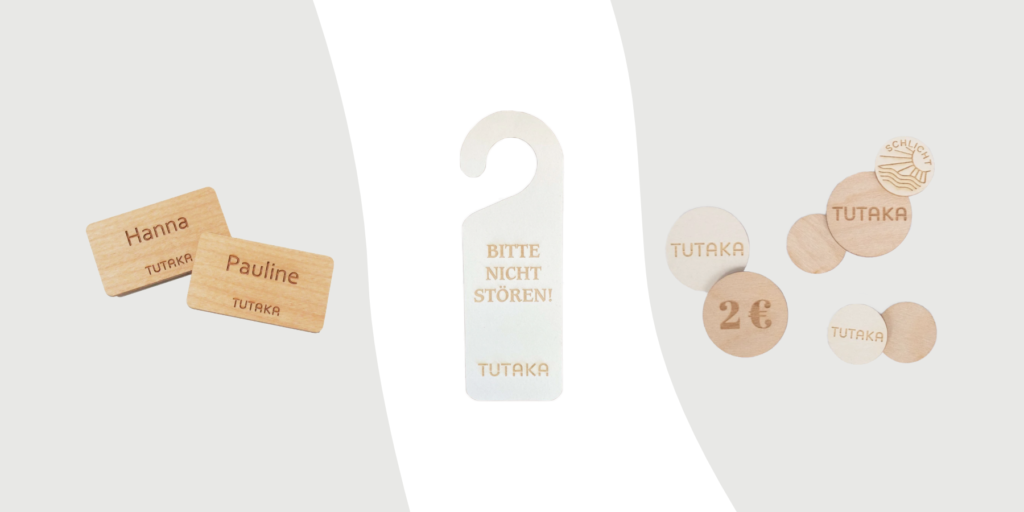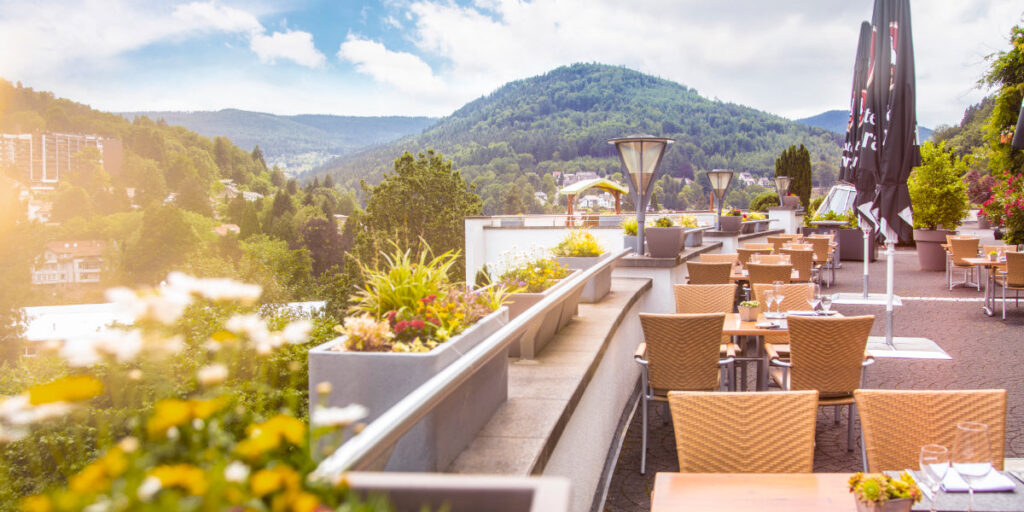Für ecoistische Reisende kann der Aufenthalt in einem Hotel im Widerspruch zu den eigenen Werten und Einstellungen stehen. Bereits zur Begrüßung wird die elektronische Zimmerkarte aus Hartplastik gereicht, im Zimmer begrüßen einen die mit 200ml PET-Flaschen gefüllte Minibar, eine Ansammlung winziger Plastik-Fläschchen im Badezimmer und (in Hotels ab 4*) nicht zu vergessen, die auf dem Bett drapierte Pappschachtel mit der obligatorisch in Plastik eingeschweißten Plastik-Duschhaube. Ja, hier fühlen sich Ecoist:innen wohl! Nun aber mal ehrlich: Hebt eine Zimmerausstattung mit reichlich Plastik- und Einwegprodukten tatsächlich das Komfort- und Wohlfühlniveau der Gäste? Natürlich nicht.
Und auch aktuelle Studien (FUR, 2019) bestätigen: Die Bedeutung von Nachhaltigkeit in Zusammenhang mit Urlaubsreisen ist groß. Laut der Reiseanalyse der Kieler Forschungsgemeinschaft Urlaub und Reisen e.V. legen hierzulande 57% der Bevölkerung ab 14 Jahren Wert darauf, dass ihr Urlaub möglichst sozial verträglich, ressourcenschonend und umweltfreundlich ist. Wissen, welches Gastgeber:innen nutzen sollten, um Qualität zu zeigen, sich vom Wettbewerb abzuheben und globale Verantwortung zu übernehmen. Wo fängt man als Hotelbesitzer:in da am besten an? Zum Beispiel mit der nachhaltigen, Zero-Waste-Transformation des Kerngeschäfts: Der Gästeübernachtung. Wie kann dein Hotelzimmer Geschichten von erholsamen Nächten, Klimaschutz, gesunder Haut, fairem Handel und Wertschätzung für Mensch & Umwelt erzählen? Das zeigen wir dir gerne.
Relevanz & Hintergrund
Aber vorerst ein paar Hintergrundinformationen, die dir helfen, die Relevanz und Dringlichkeit einer nachhaltigen Transformation des Gastgebens besser zu verstehen.
Wie essentiell Müllvermeidung und -reduktion für eine nachhaltig wirtschaftende und zukunftssichere Hotellerie ist, zeigen u.a. Impact-Reports der Europäischen Kommission (Styles et al., 2013), des United Nations Environment Programm (Rivera et al., 2011) und die Umwelt-, Gesundheits- und Sicherheitsrichtlinien für Hotellerie und Gastronomie der World Bank Group (IFC, 2007). Der Tourismussektor ist für einen prozentualen Anteil von 6.7% des gesamten Müllaufkommens des Dienstleistungssektor der EU-Staaten verantwortlich (Styles et al., 2013). Dieser verhältnismäßig geringe Prozentwert ist auf den dominierenden Anteil des im Baugewerbe anfallenden Bauschutt zurückzuführen. Im Gegensatz zu letzterem ähnelt die Zusammensetzung des Abfalls in der Hotellerie dem privater Haushalte. Entsprechend kleinteiliger ist dessen Zusammensetzung, wodurch einzelne Komponenten schneller in die Umwelt gelangen, dort entsprechend beweglicher sind und ökologische Folgeschäden verursachen. Darüber hinaus entsteht das touristische Müllaufkommen oft in Gebieten, die sehr sensibel gegenüber Müllverschmutzung sind (Muñoz & Navia, 2015). Insbesondere Resort und Spa Hotels, welche in naturnahen Erholungsgebieten und oft in unmittelbarer Strandnähe situiert sind, können häufig nicht von der gut ausgebauten städtischen Infrastruktur für Abfallmanagement profitieren (ebd.). Hier bietet sich ein erhöhtes Gefahrenpotenzial für das Eindringen von Müll in umliegende Ökosysteme.
Mit rund einem Kilogramm Müll produziert der durchschnittliche europäische Gast eines mittelständischen Hotels pro Nacht in etwa doppelt so viel Müll, wie in einem normalen Haushalt zu gleicher Zeit anfällt (IFC, 2007; Rivera et al., 2011). Neben trennbaren Wertstoffen, wie Biomüll (31%), Glas (6%), Papier (12%) und Plastik & Metall (2%), setzt sich der Abfall in Hotels zu knapp der Hälfte (49%) aus Restmüll zusammen (Ecotrans, 2006).
Müllaufkommen im Hotelzimmer
Laut dem Kriterienkatalog für Hotelzertifizierungen (2020-2025) sind Hotels verpflichtet, dem Gast im Hotelzimmer diverse Kosmetikartikel (Shampoo, Zahnbürste & -becher, etc.) bereitzustellen – in einem Fünf-Sterne-Hotel sogar verpflichtend aus Einzelflacons. Meistens bestehen die travel-size Verpackungen aus Plastik, welche nach dem (kurzen) Aufenthalt des Gastes mitsamt des übrig gebliebenen Restproduktes entsorgt werden.
Eine Umweltstatistik der EU bestätigt, dass Hotels vor allem zu einem vermehrten Verpackungsmüllaufkommen beitragen (Eurostat, 2010). Konkrete Messungen beliebter Umverpackungsmaterialien wie Plastik und Metall in der Hotellerie ergaben jedoch nur einen geringfügigen Anteil von 2% (Ecotrans, 2006). Tatsächlich aber weisen viele Studien (vgl. Conservation International, 2005; Ecotrans, 2006; IFC, 2007) daraufhin, dass es in Hotels oft an sorgfältiger Trennung von Wertstoffen (wie Plastik, Metall oder Papier) mangelt. Laut Kriterienkatalog ist beispielsweise die Bereitstellung von nur einem Abfalleimer im Hotelzimmer ausreichend. Viele Hoteliers argumentieren zwar, dass die Mülltrennung durch das Hotelpersonal gewährleistet werde, doch die Messwerte sprechen eine andere Sprache.
So entgehen viele wertvolle Rohstoffe der Wiederverwertung, wodurch sie in den Wirtschaftskreislauf zurückkehren und landen stattdessen im Restmüll. Neben umwelt- und ressourcenschonenden Aspekten, zeigt sich hier, dass eine Müllvermeidungsstrategie auch eine nicht zu vernachlässigende ökonomische Bedeutung für den Betrieb hat, da mit zunehmendem Restmüllaufkommen, Abfallentsorgungsgebühren steigen.
Mit guten Produkten und Partner:innen Geschichten erzählen
Die Kommunikation von Nachhaltigkeit ist eine herausfordernde Aufgabe. Ein Zero Waste Konzept in deinem Hotelzimmer spricht für sich, erzählt mit seinen Produkten Geschichten und vermittelt Gästen aus erster Hand die Nachhaltigkeitsambitionen der Gastgeber:innen. Bereits mit kleinen Veränderungen und geringen Investitionskosten kannst du dein Angebot differenzieren und zeigen, dass Du die Sorgen und Wünsche Deiner Gäste teilst. Authentische Nachhaltigkeitskommunikation macht dein Angebot für nachhaltigkeitsbewusste Reisende attraktiver und sichert dir langfristig ihre Loyalität und Unterstützung.Das schlagen wir vor:
First things first!
- Die elektronische Schlüsselkarte: hat längst in vielen Hotels Einzug gehalten. Eine ökologische Alternative zum üblichen Hartplastik bieten Karten aus Holzfasern.
- Willkommensbotschaft auf hölzernem Türhänger verkünden. Das spart nicht nur Papier sondern ist auch mehrfach verwendbar und zeigt zudem deinen Innovationsgeist.
Im Hotelzimmer
- Das Kernprodukt der Hotelübernachtung? Das Schlafen! Mit Cradle to Cradle zertifizierten Hotelmatratzen garantiert man seinen Gäst:innen einen angenehm federleichten Zero Waste Schlaf.
- Eco-Willkommensgeschenk: Das obligatorische Mini-Schokotäfelchen ist nicht nur in Alufolie verpackt, sondern meist auch nur von kurzer Dauer. Viel schöner finden wir, Eco-Gastgeschenke mit Sinn: Zum Beispiel ein handgemachtes Sorgenpüppchen von Weber:innen aus Guatemala oder leckeres Popcorn in praktischer Betthupferl-Größe.
- Hotelslipper für warme Füße: Dann bitte unverpackt und waschbar aus Biobaumwolle, -leinen oder recyceltem PET. Übrigens findest Du hier eine praktische Übersicht mit allen Slipper-Modellen im Vergleich.
- Bettwäsche: Fairtrade-zertifizierte Bettwäsche aus Biobaumwolle erfüllt nicht nur Umwelt- & Sozialstandards, sondern auch die Qualitätsansprüche deines Angebots.
- Erfrischend: Weg mit den eingepackten Plastikbechern und Wasser aus Plastikflaschen. Viel schöner und müllfrei sind Kupferbecher mit eingraviertem Muster oder schöne Karaffen für Leitungswasser.
- Minibar: Share x TUTAKA Minibar: Zusammen mit dem Sozialen Unternehmen Share haben wir unsere eigene Minibar entwickelt. Die Share x TUTAKA Minibar funktioniert nach dem 1 + 1 Prinzip. heißt: Eine Riegel spendet eine Mahlzeit, ein Wasser einen Tag Trinkwasser. Alle Produkte sind außerdem aus biologischen Zutaten. Du willst mehr zum Thema ‘Minibar’ wissen? Wir bieten Zero Waste Minibar Workshops an.
- Deine Gäste stehen eher auf Heißgetränke? Wir haben nachhaltige und geprüfte Kaffeeprodukte und -zubehör.
- Snackautomat: Anstelle einer Minibar auf jedem Zimmer, genügen aber vielleicht auch ein Snackautomat pro Etage oder verlängerte Öffnungszeiten der Hausbar.
Ablagen & Schränke
- Verwende Kleiderbügel aus langlebigen und innovativen Materialien, wie z.B. Wiesengras. Mit Hosenbügel oder ohne.
Beide gibt es auch mit unserem Branding! Du hast die Qual der Wahl.
Im Badezimmer
- Verwende auch hier Fairtrade zertifizierte Hand- und Badetücher.
- Shampoo & Seifen: Hier gilt unser Grundsatz: Eco not ego. Verzichte auf einzelne Mini-Verpackungen für Shampoo und Co. und verwende stattdessen wiederbefüllbare Seifen- und Shampoo-Spender. Zum Beispiel unseren Trockenseifenspender gefüllt mit zertifizierten Bio-Seifenstücken.
- Für die Dusche und das persönliche Wellness-Programm deines Gastes schlagen wir Bio-zertifizierte Hotelkosmetik in nachhaltigen Spenderflaschen vor. Egal ob Sport- oder Wellnesshotel, für jedes Einsatzgebiet ist etwas Passendes dabei.
- Zahnbürsten aus Bambus sind ressourcenschonend und kompostierbar und sind auf Nachfrage an der Rezeption erhältlich.
- Verwende Zahnputzbecher aus (recyceltem) Glas oder Porzellan und nicht aus Plastik.
- Nutze Wattestäbchen mit Bambus- oder Holzschaft mit Biobaumwolle.
- Verzichte auf Duschhaube, Kamm, Nagelpflegesets, Rasierer und Co. oder stelle es nur auf Nachfrage an der Rezeption bereit.
- Kleine Zero-Waste-Ausnahme: Gästebäder müssen neben Wohlbefinden auch höchste Ansprüche an Privatsphäre und Hygienestandards erfüllen. Stelle daher eine kleine Auswahl an Tampons aus Biobaumwolle zur Verfügung.
- Gib Gästen die Möglichkeit auf Housekeeping und Handtuchwäsche zu verzichten und biete ihnen als Dankeschön einen kostenfreien Drink an der Hotelbar an.
Last but not least: Hygiene
- Das obligatorische Hygienekonzept kommt Gastgeber:innen in ihrer Nachhaltigkeitsstrategie gerade ziemlich in die Quere. Anstatt mit Plastikfolien und Klebeband in Restaurants den Sicherheitsabstand zu wahren, lieber Nachhaltige Trennwände aus Pappe verwenden.
- Statt unschöne medizinische Desinfektionsmittelspender, kannst Du schlichte, schicke und vielseitig einsetzbare Spender aus biobasiertem Kunststoff einsetzen.
- Verzichte auf Einwegmasken und biete deinen Mitarbeiter:innen und Gästen mehr Komfort mit bequemen Masken aus zertifizierter Bio-Baumwolle.
Du suchst weitere Inspiration?
Bezugsquellen
Conservation International (2005): Linking Communities, Tourism & Conservation: A Tourism Assessment Process. In: Conservation International, Washington DC.
Ecotrans (2006): Environmental initiatives by European tourism businesses: Instruments, indicators and practical examples. Ecotrans, Saarbrücken.
Styles, D., Schönberger, H., Galvez Martos, J.L. (2013): Best Environmental Management Practice in the Tourism Sector. EUR Scientific and Technical Research Reports.
Eurostat (2010): Environmental statistics and accounts in Europe. Eurostat, Luxembourg.
IFC (2007): Environmental, Health, and Safety Guidelines for Tourism and Hospitality Development. IFC, Washington D.C.
FUR Forschungsgemeinschaft Urlaub und Reisen e.V. (2019): Reiseanalyse 2019: Erste ausgewählte Ergebnisse der 49. Reiseanalyse zur ITB 2019.
Muñoz, E. & Navia, R. (2015): Waste management in touristic regions. In: Waste Management & Research, vol. 33, no. 7, pp. 593 –594.
Rivera, L., Pratt, L., Bien, A. (2011): Tourism. In: UNEP (2011): Towards a Green Economy: Pathways to Sustainable Development and Poverty Eradication.


